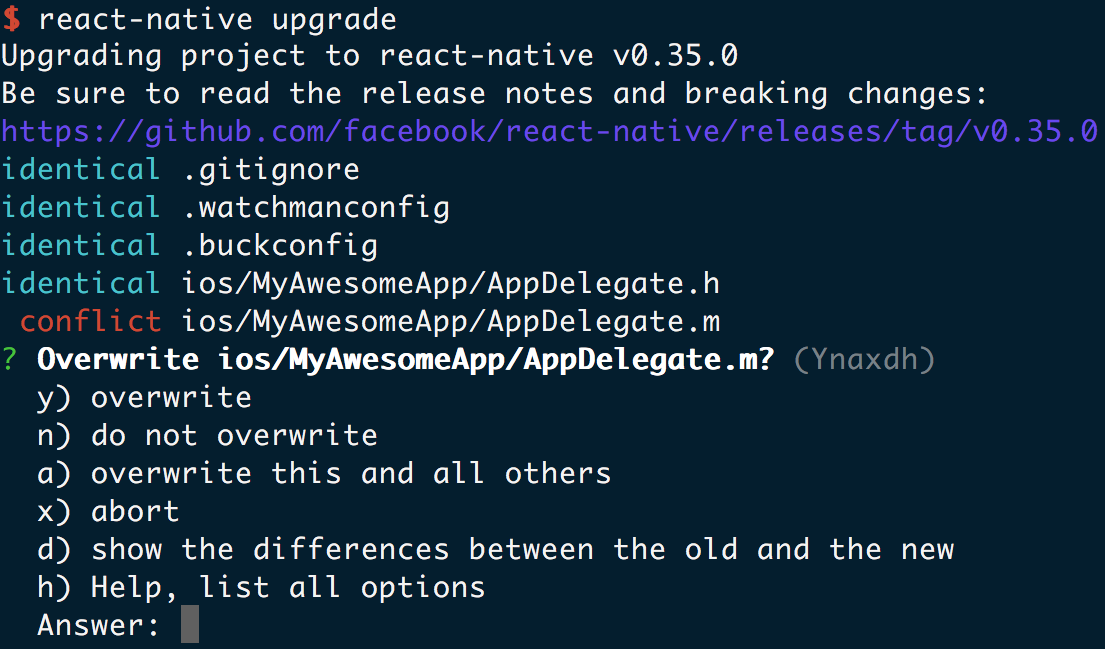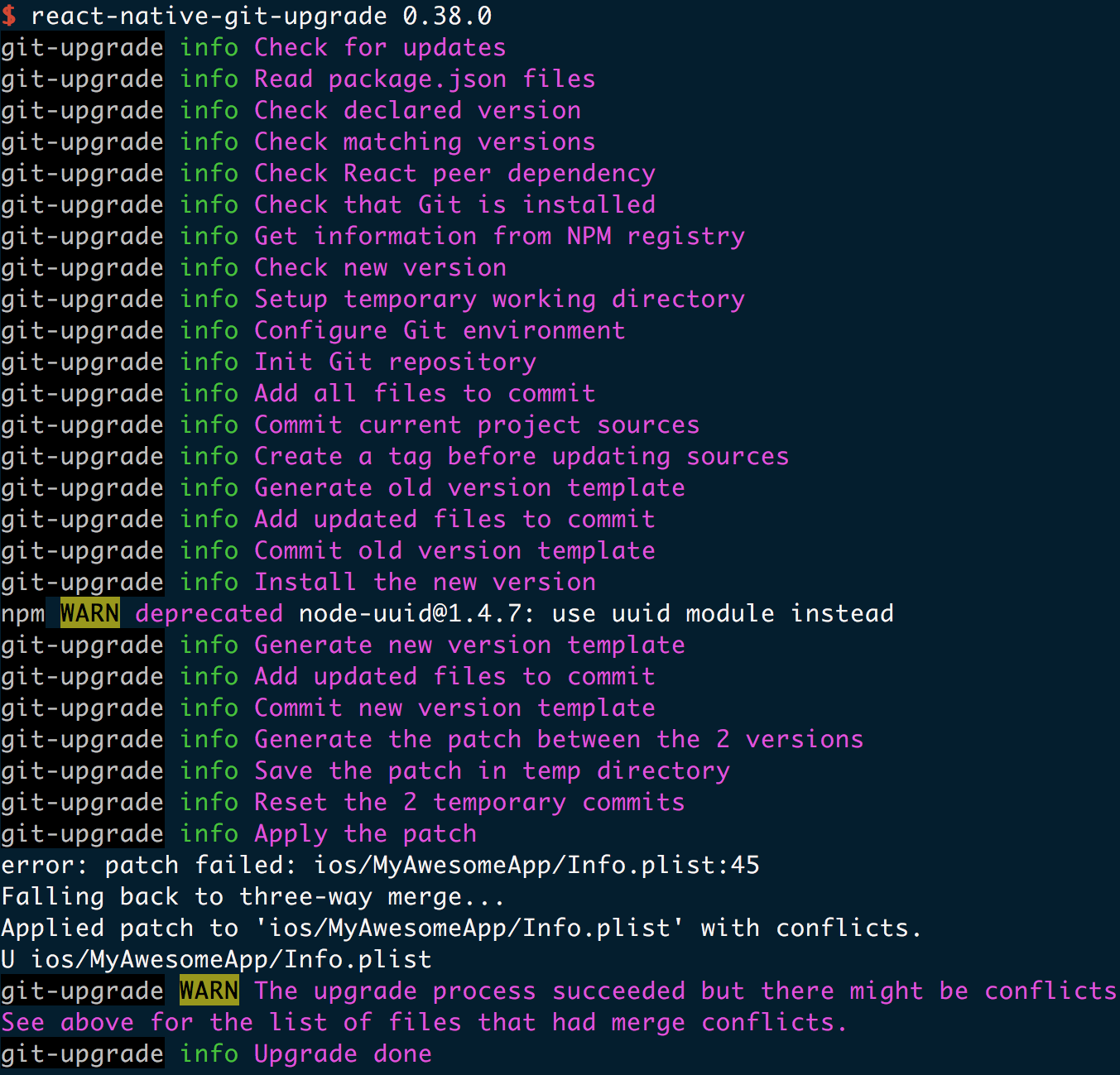Easier Upgrades Thanks to Git
Upgrading to new versions of React Native has been difficult. You might have seen something like this before:

None of those options is ideal. By overwriting the file we lose our local changes. By not overwriting we don't get the latest updates.
Today I am proud to introduce a new tool that helps solve this problem. The tool is called react-native-git-upgrade and uses Git behind the scenes to resolve conflicts automatically whenever possible.
Usage#
Requirement: Git has to be available in the
PATH. Your project doesn't have to be managed by Git.
Install react-native-git-upgrade globally:
$ npm install -g react-native-git-upgradeor, using Yarn:
$ yarn global add react-native-git-upgradeThen, run it inside your project directory:
$ cd MyProject$ react-native-git-upgrade 0.38.0Note: Do not run 'npm install' to install a new version of
react-native. The tool needs to be able to compare the old and new project template to work correctly. Simply run it inside your app folder as shown above, while still on the old version.
Example output:

You can also run react-native-git-upgrade with no arguments to upgrade to the latest version of React Native.
We try to preserve your changes in Android and iOS build files, so you don't need to run react-native link after an upgrade.
We have designed the implementation to be as little intrusive as possible. It is entirely based on a local Git repository created on-the-fly in a temporary directory. It won't interfere with your project repository (no matter what VCS you use: Git, SVN, Mercurial, ... or none). Your sources are restored in case of unexpected errors.
How does it work?#
The key step is generating a Git patch. The patch contains all the changes made in the React Native templates between the version your app is using and the new version.
To obtain this patch, we need to generate an app from the templates embedded in the react-native package inside your node_modules directory (these are the same templates the react-native init commands uses). Then, after the native apps have been generated from the templates in both the current version and the new version, Git is able to produce a patch that is adapted to your project (i.e. containing your app name):
[...]
diff --git a/ios/MyAwesomeApp/Info.plist b/ios/MyAwesomeApp/Info.plistindex e98ebb0..2fb6a11 100644--- a/ios/MyAwesomeApp/Info.plist+++ b/ios/MyAwesomeApp/Info.plist@@ -45,7 +45,7 @@ <dict> <key>localhost</key> <dict>- <key>NSTemporaryExceptionAllowsInsecureHTTPLoads</key>+ <key>NSExceptionAllowsInsecureHTTPLoads</key> <true/> </dict> </dict>[...]All we need now is to apply this patch to your source files. While the old react-native upgrade process would have prompted you for any small difference, Git is able to merge most of the changes automatically using its 3-way merge algorithm and eventually leave us with familiar conflict delimiters:
13B07F951A680F5B00A75B9A /* Release */ = { isa = XCBuildConfiguration; buildSettings = { ASSETCATALOG_COMPILER_APPICON_NAME = AppIcon;<<<<<<< ours CODE_SIGN_IDENTITY = "iPhone Developer"; FRAMEWORK_SEARCH_PATHS = ( "$(inherited)", "$(PROJECT_DIR)/HockeySDK.embeddedframework", "$(PROJECT_DIR)/HockeySDK-iOS/HockeySDK.embeddedframework", );======= CURRENT_PROJECT_VERSION = 1;>>>>>>> theirs HEADER_SEARCH_PATHS = ( "$(inherited)", /Applications/Xcode.app/Contents/Developer/Toolchains/XcodeDefault.xctoolchain/usr/include, "$(SRCROOT)/../node_modules/react-native/React/**", "$(SRCROOT)/../node_modules/react-native-code-push/ios/CodePush/**", );These conflicts are generally easy to reason about. The delimiter ours stands for "your team" whereas theirs could be seen as "the React Native team".
Why introduce a new global package?#
React Native comes with a global CLI (the react-native-cli package) which delegates commands to the local CLI embedded in the node_modules/react-native/local-cli directory.
As we mentioned above, the process has to be started from your current React Native version. If we had embedded the implementation in the local-cli, you wouldn't be able to enjoy this feature when using old versions of React Native. For example, you wouldn't be able to upgrade from 0.29.2 to 0.38.0 if this new upgrade code was only released in 0.38.0.
Upgrading based on Git is a big improvement in developer experience and it is important to make it available to everyone. By using a separate package react-native-git-upgrade installed globally you can use this new code today no matter what version of React Native your project is using.
One more reason is the recent Yeoman wipeout by Martin Konicek. We didn't want to get these Yeoman dependencies back into the react-native package to be able to evaluate the old template in order to create the patch.
Try it out and provide feedback#
As a conclusion, I would say, enjoy the feature and feel free to suggest improvements, report issues and especially send pull requests. Each environment is a bit different and each React Native project is different, and we need your feedback to make this work well for everyone.
Thank you!#
I would like to thank the awesome companies Zenika and M6 Web without whom none of this would have been possible!